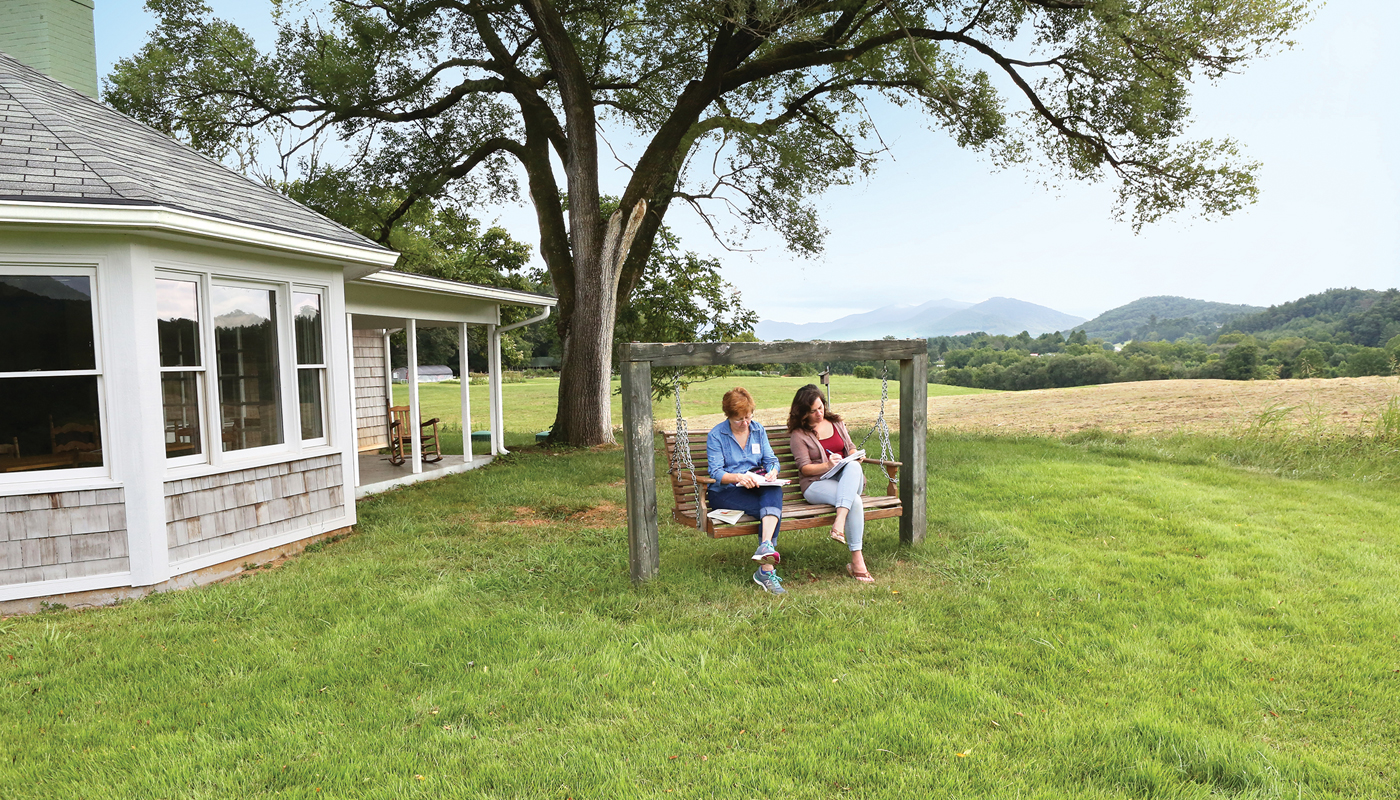
13 Feb Writing Memories into Family Histories with Robin Edgar
I had the pleasure of sitting next to Robin Edgar in the herbalism class during Shaker Week. I learned that she and her husband, David Edgar, have been teaching classes at the Folk School since 1996. Robin teaches writing, and David teaches the unique craft of turning recycled plastic into art. In her class, Turning Fond Memories into Family Histories, students will discover how to use sights, sounds, and smells to recall and record meaningful memories. I was eager to learn more, so I sat down with Robin to talk to her about her class and the benefits, practice, and joys writing. Enjoy our interview!
Cory: Your class is about turning memories into family histories. In your class, will students tap into their family history to connect with ancestors, or are they using their memories to write a history for their descendants?
Robin: It’s really both. They mostly come to get their stories down for future generations, but the process helps them connect to who they are and why they are here.
Before there was a written language, oral societies used storytelling to explain and preserve their cultural history and the memories of ancestors; they explained the world that was both seen and unseen. The repetition of these stories created an affirming affect on individuals and helped to establish their value system. Today’s literate society still needs this powerful connection. That is why scrapbooking and genealogy are so popular. As individuals recall and record the stories about individuals and incidents that shaped their lives, they can also celebrate the similarities and differences across generational, socio-economic, and ethnic lines.
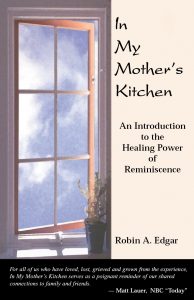 Cory: The title of your first book, In My Mother’s Kitchen: An Introduction to the Healing Power of Reminiscence, implies that food is an important connection to family history. Why do you think food is a good prompt to explore family history?
Cory: The title of your first book, In My Mother’s Kitchen: An Introduction to the Healing Power of Reminiscence, implies that food is an important connection to family history. Why do you think food is a good prompt to explore family history?
Robin: Since we generally eat three meals a day, with significant people in our lives, many memories are triggered by the smell or sight of foods.
My first book, which I developed from the syllabus for my Folk School Writing course, is an introduction to using the senses (smell, sight, sound, sight) to recall, record, and celebrate the significant memories that help us recognize and value the individuals and incidents that shaped our lives. As a former actress and mime, I knew how sense memory worked to connect to an emotional event.
Recent studies in Alzheimer’s research find that emotional events trigger the storage of long term memory, and that the senses can connect us to those memories. For instance, certain aromas like fresh baked bread or pies, pipe tobacco, or White Shoulders perfume brings back memories of our parents.
Cory: Can you describe the senses you associate most with the Folk School?
Robin: I love the sight pulling up to the Keith House after the long journey to get there. I also enjoy the smell of the woods, walking along the path from the Keith House to my classroom. Let’s face it, the smell of wholesome food cooking in the dining room is heavenly, too!
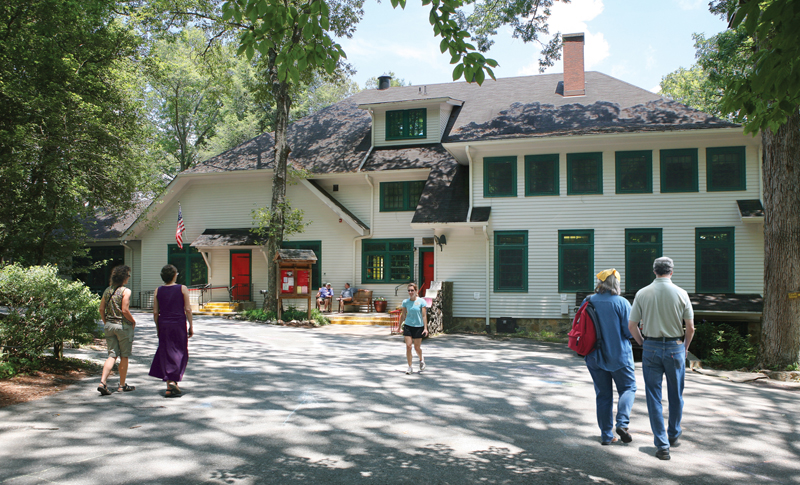
Many folks regard the Keith House as the heart of the Folk School.
Cory: Much of your work seems to center around recording personal histories, reminiscence for bereavement, and legacy. Can you talk about why that is meaningful for you?
Robin: When I put together the syllabus for my first writing course, I used written accounts of memories about my mother, who I lost to cancer, as examples. The stories identified and celebrated the wonderful qualities that made my mother who she was and also defined how her life affected me as an individual. This process and its outcome is what my writing classes are all about. That is why I first called it “The Healing Power of Reminiscence.”
Cory: How is writing a good tool for healing? Do you think writing is therapeutic?
Robin: Journaling is a useful tool for those who are grieving the loss of a loved one. They can develop rituals from family stories to celebrate the times they had with them to ease the pain of loss. Also a helpful tool for recording family history, as people look back on significant events in their lives, they may see that lemons turned to lemonade or, like Jimmy Stewart in the movie It’s A Wonderful Life, that they did make a difference.
Cory: Who is the ideal student for your class? What can students expect in your class?
Robin: Everyone has a story to tell so this class is for anyone who desires to tell that story! No matter what their previous writing experience may be, my students come away from my course with the basic knowledge on how to tell their stories and develop a format for their book if they so desire to write one. We endeavor to complete at least three different stories by the end of the week. I meet with students individually to help them to organize their thoughts and develop the story structure. More importantly, I hope to inspire them to continue their project to record their family history once they leave.
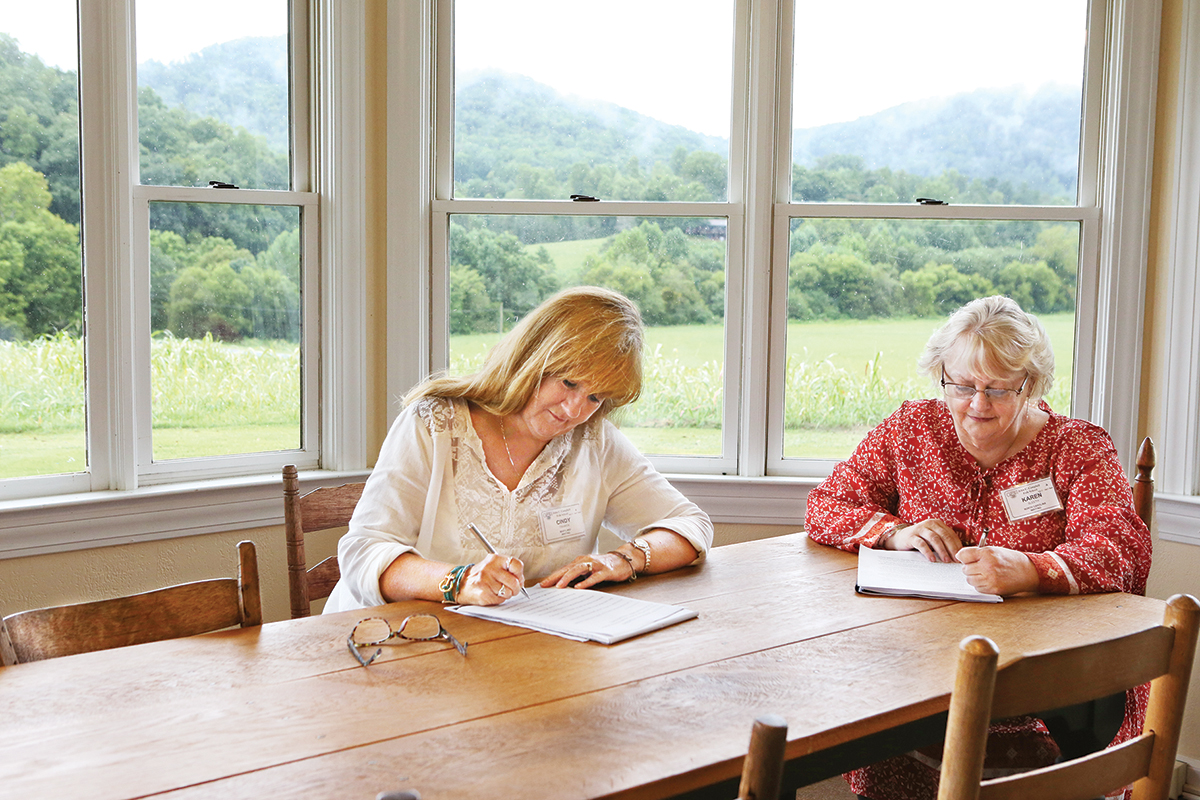
Students enjoy the sunlight Orchard House to engage in their writing practice.
Cory: Some folks do not have great relationships with their families. Some are cut off from their families. Some have lost their families. Will your class be a safe space and a good fit for them?
Robin: Not all memories are about happy times. Some recount painful experiences or times without harmony. Celebrating the laughter and the lessons are what bring comfort and allow us to forgive. For instance, in my TED talk “Reminiscence: The Healing Pathway to Forgiveness,” I share a story from a woman in her 90s who had not been able to forgive her mother for making her works so hard on the farm as a child. Once she recounted her mother’s life story to the class about being an orphan and having to work in a factory or on a farm from the age of eight, she realized that was all she knew and was able to recall many happy memories that she had suppressed all those years.
Cory: What advice do you have for aspiring writers or for folks just starting out with a writing practice?
Robin: The best advice I can give an aspiring writer is to write a story in your own voice, the way you would tell it to a friend in conversation. Everyone has different writing abilities, but I have rarely met someone who couldn’t tell a good story from their own experience. In my course, I initially have students to tell their story out loud to the class and then I teach them the principles for writing that story for the reader.
Cory: What’s your favorite Folk School memory?
Robin: I loved the first time that I taught mime at Little Middle Folk School. Being at the Folk School for the first time is like being in love for the first time. There may be others, but the first time is always special.
Cory: Do you have a favorite place on campus?
Robin: When we taught Little Middle Folk School, David and I loved to sit on the rockers on the back porch of the Keith House to view the hummingbird feeders and the vista beyond. (I kept hoping he would propose to me there, since it was so special).
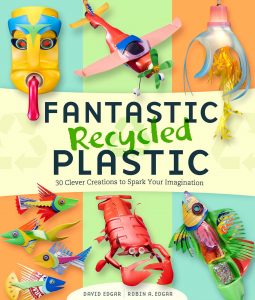
Cory: How was it co-authoring Fantastic Recycled Plastic with your husband David?
Robin: We had fun putting the book together. Unfortunately, it happened to be during a heat wave of over 100 degrees in the middle of August in a cabin in the woods with no air conditioning! We have always been good companions and still laugh about it to this day. David respected my knowledge about writing and publishing as much as I respected his knowledge and ability to make art so we were a good team.
Cory: Do you often collaborate with people?
Robin: In my reminiscence work, I often collaborate writing with others. In addition to ghost writing several books, I also co-wrote original plays with a performing arts ensemble of teens and adults with disabilities that I directed for 12 years. As a professional journalist, I wrote a column that featured profiles of celebrities as well as people from the community which necessitated working together with each person to tell their story.
Cory: Tell me about your dream-writing gig? What is the writing assignment you were most excited about?
Robin: I loved putting together the museum exhibit, documentary, and book, Personal Legacies: Surviving the Great Depression. Those stories of survival through community were life changing to me and I knew I had to share them with the world.
Cory: I watched Personal Legacies on YouTube, and it struck me how important community was to survival during the Great Depression. When I think of community, I think of the Folk School. I imagine living in Brasstown during hard times would be beneficial because the sense of community is so strong. How do you think stronger communities can be created today?
Robin: What I learned from Personal Legacies is that community is created through working side by side together for a common cause or goal. People helped one another to survive, much like we do during a natural disaster. With so much disparity of opinion these days, it’s important to have community conversations to learn how to listen to each other, and learn to not judge each other. In Tryon where I live, I have organized CommUnity Conversations where we bring in facilitators who teach listening skills, so we can hear each other’s stories, and find kinship as well as forgiveness. We also hold coffee houses to bring people together through music and dance.
Cory: Why do you like teaching at the Folk School?
Robin: Listening to each other’s stories in class during the week brings all of us together in a sort of micro community. We find out things that we have in common, and learn things about each other that we may have otherwise never known. This bonding never fails to make a difference in my student’s lives and mine.
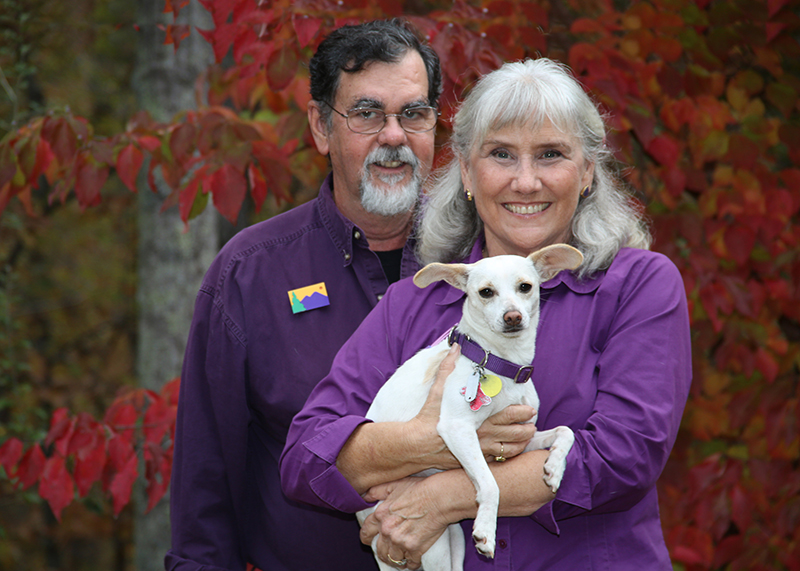
Robin & David Edgar, powerhouse Folk School teaching duo since 1996!
Robin’s Bio
Robin has been a professional writer for 40 years. She uses her first book, In My Mother’s Kitchen: An Introduction to the Healing Power of
Reminiscence, as a workbook for teaching life writing and reminiscence workshops around the country. Her other books include Personal Legacies: Surviving the Great Depression, which became the basis for a Charlotte History Museum exhibit and a PBS documentary, and, most recently, the children’s book, The Day Morris Quit. Robin also co-authored Fantastic Recycled Plastic, which features the art of her husband, David Edgar.



No Comments